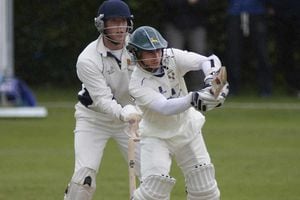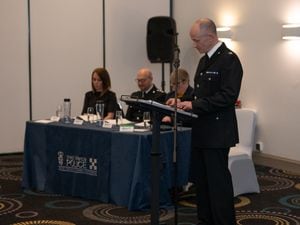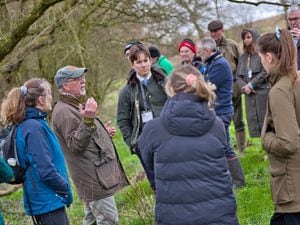Former Shrewsbury and England cricketer James Taylor forced to call time on career over heart condition
Former Shrewsbury Cricket Club and England international cricketer James Taylor has been forced to call time on his career due to a serious heart condition.

The former Shropshire man withdrew from last week's fixture against Cambridge MCCU with what was believed to be a viral condition.
However, specialist scans have revealed that the 26-year-old has the very serious heart condition, ARVC (Arrhythmogenic Right Ventricular Cardiomyopathy).
Taylor, who turned out in the Birmingham League for Shrewsbury, played the first of his seven Tests against South Africa in 2012.

Shrewsbury Cricket Club's first team captain, Rob Foster, said: "He is still our contracted cricketer and obviously I am just really sad for him.
"I am gutted and shocked, he is probably one of the fittest lads around and no-one works harder than he does.
"He's only just started to get his big chance, so he will be really gutted with the news."
Taylor, whose nickname is Titch, spent a season playing for Shrewsbury Cricket Club when he was studying in the town at Shrewsbury School, where he was a record-breaking batsman.
He has played for the club on a few occasions over the past three years while also playing for England.
Mr Foster said: "He is such a talent and someone at the club who everyone is friends with and he is part of the club.
"Everyone is proud of how he has come from playing for the club to play for England.
"He was enjoying playing for England and has always done well, it is just such a shame that he hasn't been able to have a real chance to kick on with international cricket."
Taylor was awarded the Young Wisden Schools Cricketer of the Year for his 898 runs for Shrewsbury School in 2008, at an average of 179.60.
He was part of the England team that won famously against the same opposition last winter.
The middle-order batsman also played 27 ODIs and was captain for England's trip to Ireland last May.
Wolves midfielder Dave Edwards, born in Pontesbury and a star graduate of the Shrewsbury Town youth system, was among the first to pay tribute to Taylor.
England and Wales Cricket Board director Andrew Strauss added: "It is both shocking and saddening to hear that James' career has been cut short in such a sudden and unexpected manner.
"Throughout his career, he has constantly impressed with his determination to make the absolute most of his ability, and it is immensely cruel that such a hard-working player will be unable to fulfil his great potential in the international arena.
"The ECB will work closely with Nottinghamshire and together we will do everything possible to help James through this difficult period, and aid him in his recovery."
What is ARVC?
ARVC is an inherited condition, which means it is passed on through families. It is caused by a change or mutation in one or more genes - some people may inherit the genetic mutation but not develop the condition. ARVC can affect teenagers or young adults and has been the reason for some sudden unexplained deaths in young athletes.
Are there visible symptoms?
ARVC is usually progressive and can lead to sudden death in some cases. Most people with ARVC are at low risk of sudden cardiac death but sometimes the condition is more active - characterised by unexplained dizzy spells, sustained palpitations or blackouts - and the risk is higher.
How does it affect the heart?
Cells within the heart muscle are held together by proteins, but these proteins do not develop properly in people with ARVC. This leads to the detachment of the heart muscle cells, causing fatty deposits to build up as the body attempts to repair the damage. ARVC usually affects the right side of the heart and means the walls of one heart chamber become thin and stretched, which has an impact on how blood is pumped around the body and can cause abnormal heart rhythms.
How quickly does it develop?
According to the British Heart Foundation (BHF), it usually takes many years for the condition to develop so most people are not diagnosed until later in life. ARVC usually develops in four phases, with the first phase occurring when there are small changes in the right ventricle and the second when noticeable structural changes occur to the heart muscle that affect its ability to pump. The third phase is when pumping becomes weaker as the right ventricle becomes stretched while in the fourth phase, the left ventricle becomes affected and the heart may pump weakly on both sides.
Can it be treated?
ARVC cannot be cured, but medicines can help control abnormal heart rhythms while a procedure called catheter ablation can help destroy malfunctioning tissue and force the heart to no longer send abnormal signals. Cardioversion - using electrical shocks to "re-set" the heart - may also be used.
Are there different types of cardiomyopathy?
Nottinghamshire director of cricket Mick Newell spoke of the shock of everyone at Trent Bridge.
He said: "Myself and all of James' team-mates and colleagues are terribly sad to hear this news, which comes as a big shock to us all.
"He is a model professional, the most hard-working I've ever known in cricket, making it all the more difficult to accept that his career has been cut short in this way.
"It goes without saying that he has the very best wishes of us all in terms of recovering from his operation, and that we are looking forward to seeing him back at Trent Bridge when he is fit and able."





